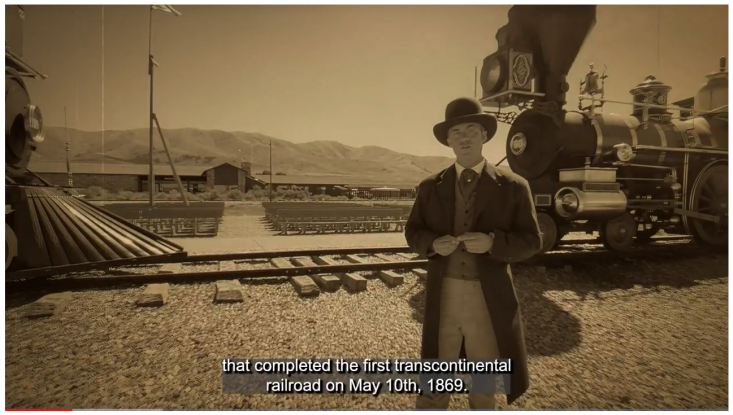Happening Now
Happy ‘National Train Day’!
May 10, 2024
By Jim Mathews / President & CEO
Guess what? It was 155 years ago today that Leland Stanford (of Stanford University fame) drove a ceremonial Golden Spike in a ceremony in Promontory, Utah, joining two railroads – the Central Pacific and the Union Pacific – marking the historic moment when the United States was truly linked together from coast-to-coast for the very first time: May 10, 1869.
In 2008, Amtrak came up with the idea of National Train Day, celebrated on the first available Saturday closest to May 10th, and by 2012 Train Day had become a truly national event with big splashy bashes in DC, Philadelphia, Chicago, Los Angeles, and lots of fun National Train Day events at smaller stations around the country.
TV’s “Cake Boss” Buddy Valastro even presented an anniversary cake to Amtrak in 2010’s Penn Station event in New York City.
In 2015, just a few months after I arrived at Rail Passengers, Amtrak dropped Train Day from its official marketing budget which, to be fair, was smaller at the time than your local grocery store’s money for newspaper flyers. If things couldn’t be done for free or through press appearances – what they call “earned media” in the biz – it wasn’t going to happen.
Well even though it’s been ten years since we had an official Amtrak-backed Train Day, lots of civic organizations, local Chambers of Commerce, and, of course, rail advocates still put on their own Train Day celebrations on the closest Saturday. That means tomorrow you might just find a Train Day event happening near where you live...and if you do, I’d encourage you to go and have fun!
But when you go, you should also think about how much better things are today than they were ten years ago when Amtrak – with an empty marketing budget and facing a hostile Congress – had to walk away from celebrating this important anniversary.
> Congress gave Amtrak and passenger rail $66 billion guaranteed, the biggest infusion of Federal support at one time in its history, signed into law in 2021 and with the first chunks distributed a year later in 2022.
> Federal regulators have gotten serious about cracking down on freight-train interference slowing down passenger trains to the point where they were often useless.
> Two long-awaited new services are poised to launch this year – the Borealis, the second train between Chicago and the Twin Cities, and the Mardi Gras between New Orleans and Mobile, a first small baby-step toward full restoration of service between New Orleans and Florida wiped out by Hurricane Katrina.
> Amtrak has tentatively set aside $7 billion in funds from the Investment in Infrastructure and Jobs Act/Bipartisan Infrastructure Law for new long-distance passenger cars, and is very close to introducing new trainsets to replace the Acela and regional equipment nationwide.
> At Congress’ direction, the Federal Railroad Administration is leading a long-distance restoration study which, if the proposals being advanced in the draft remain in the final recommendations, would double long-distance service to some 30 distinct routes, provide access to more than half of those Americans who today have no access to Amtrak, and more than double access to parts of the country left behind such as the Southeast, Midwest/Plains, and tribal lands.
> Better yet, the long-distance study didn’t even put the three-times-per-week service paradigm up for debate: the baseline map in the FRA study presumes that the Cardinal and the Sunset Limited would once again run at least once a day in each direction, versus the three times per week they run today.
“When you’re standing here, you’re standing where the United States became united, where we became a two-ocean trade partner, where we gained the ability to transport goods, people, and ideas quickly across the continent,” says a National Park Service Ranger in the introductory video they show to visitors at Golden Spike National Historic Park.
Indeed. Thanks to the work of this Association, its deeply dedicated members and volunteers, and the Association’s professional staff, the ability to transport goods, people, and ideas seems to have recaptured Congress, Federal officials, and hundreds of communities large and small across the U.S. By this time next year, National Train Day will deserve to be a truly “National” celebration again!
"I’m so proud that we came together in bipartisan fashion in the Senate to keep the Southwest Chief chugging along, and I’m grateful for this recognition from the Rail Passengers Association. This victory is a testament to what we can accomplish when we reach across the aisle and work together to advance our common interests."
Senator Tom Udall (D-NM)
April 2, 2019, on receiving the Association's Golden Spike Award for his work to protect the Southwest Chief

Comments